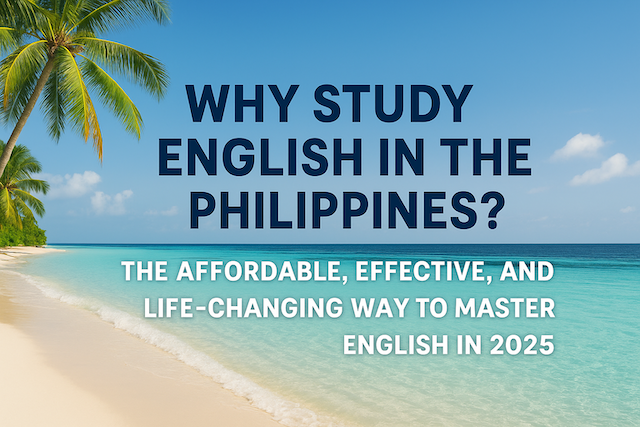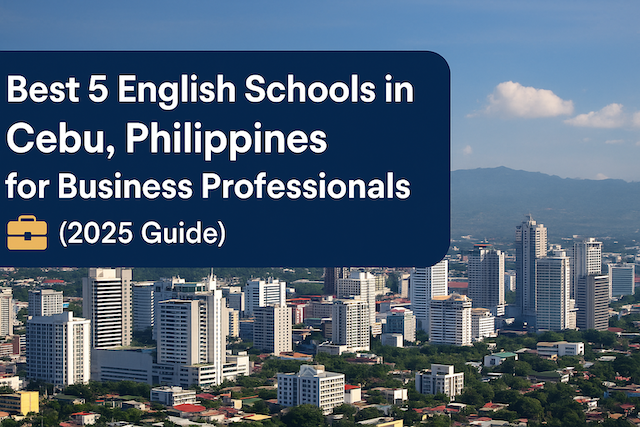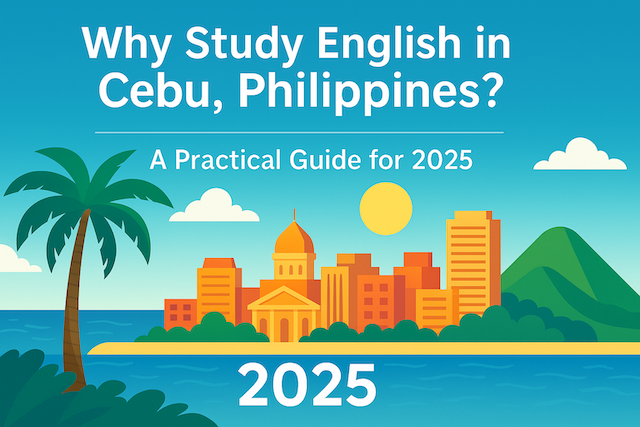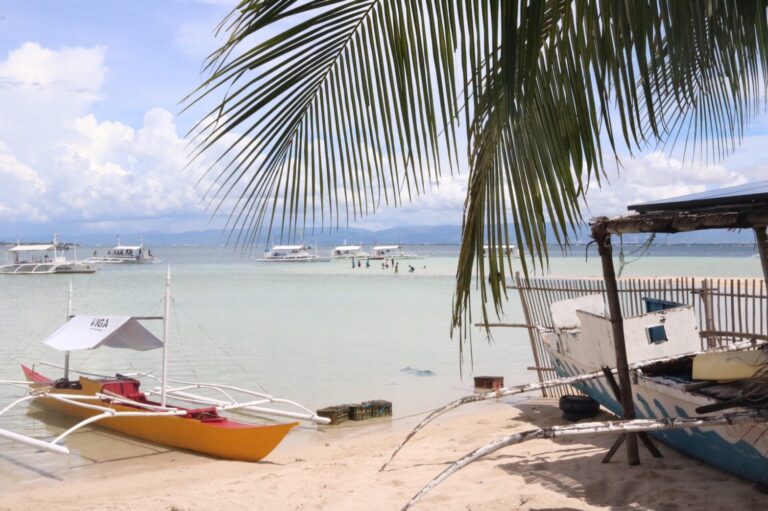Why Study English in the Philippines?
内容
- 1 Why Study English in the Philippines? The Affordable, Effective, and Life-Changing Way to Master English in 2025
- 2 ✍️ はじめに
- 3 🇵🇭 Why Study English in the Philippines?
- 4 📚 Available Course Types & Study Styles
- 5 💰 How Much Does It Cost to Study English in the Philippines? (Realistic 2025 Guide)
- 6 🏫 A Day in the Life: What It’s Like to Study at a Philippine ESL School
- 7 🎯 Who Should Study English in the Philippines?
- 8 💬 Student Testimonials & Success Stories
- 9 ❓ FAQ: Common Questions About Studying in the Philippines
- 9.1 🗣️ Q1: Is it OK if I can’t speak any English at all?
- 9.2 🧳 Q2: How long should I stay to see real improvement?
- 9.3 💰 Q3: Are there any hidden costs besides the package fee?
- 9.4 🏝️ Q4: Is it safe to study and live in the Philippines?
- 9.5 🛬 Q5: Do I need to arrange everything myself?
- 9.6 🌐 Q6: Will I make friends if I travel alone?
- 10 🧭 How to Choose the Right English School in the Philippines
- 11 ✅ Final Checklist
- 12 📝 Conclusion: Your English Journey Starts Here
Why Study English in the Philippines? The Affordable, Effective, and Life-Changing Way to Master English in 2025
✍️ はじめに
Are you looking for an affordable yet highly effective way to improve your English? Whether you’re preparing for a job interview, planning to study abroad, or simply trying to boost your communication skills, studying English in the Philippines might be the best decision you’ll ever make.
In recent years, the Philippines has emerged as one of the most popular destinations for English language learners around the world—especially from countries like Japan, South Korea, Taiwan, and Vietnam. Why? Because it offers an ideal combination of low cost, high-quality education, and immersive one-on-one learning. In fact, many students report that just a few weeks of intensive study in the Philippines helped them gain more confidence and fluency than months of traditional group classes in their home countries.
Unlike Western countries where group lessons dominate and costs are sky-high, English schools in the Philippines specialize in customized, one-on-one lessons. This format ensures that every student—regardless of their starting level—receives personalized attention and rapid feedback, allowing for faster progress in speaking, listening, grammar, and pronunciation.
What’s more, the Philippines is an English-speaking country. English is one of the official languages, and it’s used in schools, business, media, and even daily conversations. That means students are constantly surrounded by English—not just in the classroom, but everywhere they go. It’s a rare opportunity to study and practice English in real life, 24/7.
And let’s not forget the tropical perks: Beautiful beaches, warm weather, delicious food, and a welcoming local culture. Places like Cebu, Baguio, and Clark have become hotspots not just for learning English, but also for building global friendships and enjoying a once-in-a-lifetime adventure.
In this article, we’ll take a deep dive into the top reasons why more and more students choose the Philippines for their English journey in 2025. We’ll also cover how much it costs, what kind of courses are available, what life is like on campus, and how to choose the right school for your goals. If you’re serious about studying English abroad without breaking the bank, keep reading—you might just find your perfect match.
🇵🇭 Why Study English in the Philippines?
There are countless places around the world where you can study English—but few offer the same blend of affordability, intensity, and cultural richness as the Philippines. Here’s why thousands of students are choosing this tropical nation as their language learning destination:
1. English Is an Official Language
The Philippines is one of the few Asian countries where English is an official language. It’s used in government, business, education, and the media. That means you’ll be surrounded by English in daily life, from the moment you arrive at the airport to your trips to local cafes or shopping malls. Unlike other countries where English is only used in the classroom, the Philippines offers a full immersion environment—without the high price tag of Western nations.
2. One-on-One Classes: Learn Faster, Speak More
In many Western countries, English classes are conducted in groups of 10 to 20 students. But in the Philippines, one-on-one lessons are the standard. You get to speak more, ask more questions, and receive feedback tailored to your level and needs. This intensive style is especially effective for shy students, beginners, or anyone aiming to improve their speaking fluency quickly.
3. Lower Costs Without Sacrificing Quality
Studying English in the Philippines can cost less than half of what you’d spend in the U.S., Canada, Australia, or the UK. Tuition, accommodation, and meals are often bundled into affordable packages. Plus, the cost of living is much lower—dining out, transport, and entertainment are budget-friendly, even for long-term stays.
4. Warm Climate & Friendly People
The Philippines is famous for its hospitality and positive energy. Filipinos are naturally friendly, helpful, and welcoming to international students. Add to that the tropical weather, beautiful beaches, and vibrant local culture, and your study abroad experience becomes more than just language learning—it becomes a life experience.
5. Proven Track Record
For more than a decade, the Philippines has been hosting students from Japan, Korea, Taiwan, and even countries in the Middle East and Europe. With hundreds of ESL (English as a Second Language) schools across the country, it has become a trusted destination with a proven system for helping students reach their goals.
📚 Available Course Types & Study Styles
One of the biggest advantages of studying English in the Philippines is the diversity of course offerings. Whether you’re a complete beginner or preparing for a high-stakes English exam, you’ll find a program that fits your goals, level, and timeline. Here’s a breakdown of the most common course types and how they work:
1. General ESL (English as a Second Language)
This is the most popular program among international students. General ESL courses focus on building core communication skills—speaking, listening, reading, and writing—with an emphasis on real-life usage. You’ll usually have a mix of:
-
1:1 (One-on-One) Lessons – personalized and focused on your weak points
-
Small Group Classes – ideal for discussion, debate, or group activities
-
Self-Study Time – often with teacher guidance or homework
This course is perfect for:
-
Beginners or intermediate learners
-
Travelers or working holiday applicants
-
People who want to speak English more naturally and confidently
2. IELTS/TOEIC/TOEFL準備コース
Planning to apply to a university or move overseas for work? Test preparation courses are designed to help you achieve high scores on exams like:
-
IELTS – often required for immigration, universities, and job applications
-
トーイック – used mainly in business and corporate environments
-
TOEFL – typically for academic purposes in the U.S.
These courses offer:
-
Targeted strategies and mock exams
-
Vocabulary and grammar for test-specific formats
-
Listening and speaking drills under test-like conditions
You’ll often receive weekly progress reports and feedback to stay on track toward your target score.
3. ビジネス英語
For professionals, many schools offer Business English programs that simulate real-world scenarios. Lessons may cover:
-
Email writing, formal expressions, and presentations
-
Negotiation, meetings, and customer communication
-
Industry-specific vocabulary (e.g., hospitality, IT, healthcare)
This is ideal for:
-
Working adults aiming for a promotion
-
Future entrepreneurs or startup founders
-
International job seekers or interns
4. Special Courses & Custom Programs
Some schools also offer:
-
Junior or Family English – perfect for young learners or parents studying with children
-
English + Internship – study and get local work experience
-
Survival English – short-term programs focused on travel or basic conversation
With so many options available, you can customize your study plan based on your goals, budget, and time. Whether you’re staying for 2 weeks or 6 months, there’s a course that fits your path.
💰 How Much Does It Cost to Study English in the Philippines? (Realistic 2025 Guide)
Studying English in the Philippines in 2025 is not “cheap” in a bad way—it’s affordable and high-value. With intensive one-on-one lessons, full-board accommodation, and tropical surroundings, the country still beats most Western destinations in cost-efficiency. Here’s what it really costs.
📦 1. All-Inclusive Package Rates (Per Month)
English schools in the Philippines offer bundled packages that include everything from classes to meals and housing. This eliminates hidden costs and keeps budgeting simple.
| Room Type | Monthly Cost (USD) |
|---|---|
| 4-person shared room | $1,500 |
| 2-person twin room | $1,800 |
| Private room (single) | $2,000–$2,500 |
📌 Packages usually include:
-
6–8 hours of daily English classes (mostly one-on-one)
-
3 meals per day, even on weekends
-
Fully furnished accommodation with Wi-Fi & utilities
-
Weekly cleaning and laundry service
-
Free access to school facilities
-
Academic and lifestyle support staff
💸 2. Additional Costs to Budget For
To avoid surprises, here’s what you may spend on top of the base package:
| カテゴリー | Estimated Cost (USD) |
|---|---|
| ✈️ Roundtrip airfare | $300–$800 (from Asia) |
| 🪪 Visa & SSP fees | $350–$500 (incl. SSP) |
| 📚 Books & materials | $30–$70/month |
| 🏝️ Personal expenses | $100–$300/month (travel, SIM, etc.) |
📝 SSP(特別研究許可) is mandatory for all foreign students and costs approximately $150–$200, included above. Visa extensions (monthly) and ACR I-Card are also required for longer stays.
Even with these costs, most students can complete a 3-month program in the Philippines for less than one month of tuition alone in the U.S. or U.K.
📊 3. Updated Monthly Cost Comparison (Philippines vs. Western Countries)
| カテゴリー | 🇵🇭 Philippines | 🇺🇸🇬🇧🇦🇺 USA / UK / Australia |
|---|---|---|
| Tuition | Included in package | $1,300–$1,800 |
| 宿泊施設 | Included | $900–$1,500 |
| Meals | Included | $500–$800 |
| Visa & fees | ~$400 total | ~$500–$800 |
| Total (1 month) | $1,500–$2,500 | $2,800–$4,500+ |
✅ Same speaking time. Same immersion. Same personal growth. But you save up to 40–50%.
In conclusion, studying English in the Philippines is no longer “super cheap”—but it’s still one of the smartest and most cost-effective ways to gain serious English skills in 2025.
🏫 A Day in the Life: What It’s Like to Study at a Philippine ESL School
One of the most common questions students ask before coming to the Philippines is:
“What does a typical day look like?”
Unlike casual language programs in Western countries, English schools in the Philippines follow a structured and intensive daily schedule—designed to maximize your speaking time, reinforce new skills, and still give you space to relax and enjoy local life. Here’s what a typical weekday looks like:
⏰ Sample Daily Schedule (Weekday)
| 時間 | アクティビティ |
|---|---|
| 午前7:00 | Wake up / Breakfast at school cafeteria |
| 8:00 AM | 1:1 Speaking Class (Focus: conversation fluency) |
| 9:00 AM | 1:1 Listening or Grammar Class |
| 午前10:00 | Group Class (Discussion / Pronunciation) |
| 11:00 AM | 1:1 Writing or Vocabulary Development |
| 12:00 PM | Lunch break (local & international options) |
| 1:00 PM | 1:1 Reading / TOEIC / IELTS Focus Class |
| 2:00 PM | Optional Group Class / Test Practice |
| 3:00 PM | Self-study or coaching session |
| 5:00 PM | Free time / Gym / Nap / Homework |
| 6:00 PM | Dinner with friends in cafeteria |
| 7:00 PM | Optional Night Class / Movie Night / Language Exchange |
| 9:00 PM | Review & Relax (Netflix, chat, journaling) |
| 10:00 PM | Lights out (quiet hours in dormitory) |
🛏️ Dormitories are located inside or right next to the campus, so commuting is stress-free.
📘 Flexible Learning Styles
Students can usually customize their schedule based on:
-
🗣️ Focus: Speaking, Business English, or Test Prep
-
🕰️ Intensity: 4–8 hours/day of class time
-
🛌 Room type and lifestyle preference (quiet vs. social)
学校によっては weekend review classes, workshops, or casual group outings to places like beaches, waterfalls, or night markets.
🌴 Weekend Life & Exploration
Weekends are your chance to recharge or explore. Many students go on:
-
Island-hopping trips
-
City sightseeing
-
Café study sessions
-
Local market visits
-
Volunteer or internship programs (at some schools)
🤝 Community Life
Most students live, eat, and learn together—which creates a friendly, multicultural atmosphere. Schools often hold:
-
Cultural nights
-
Student presentation events
-
Birthday parties or “Graduation Fridays”
-
Optional weekend tours (some free, some paid)
🎉 It’s easy to make friends from Japan, Korea, Vietnam, Taiwan, and even Europe or Latin America.
Studying English in the Philippines isn’t just about textbooks—it’s about living the language every day, in and out of the classroom. For many students, it becomes one of the most memorable and transformative periods of their life.
🎯 Who Should Study English in the Philippines?
The truth is: there’s no single type of student who benefits from English study in the Philippines. Thanks to its flexible, one-on-one based education system, a wide variety of learners—from complete beginners to professionals—find value here.
Below are some of the most common profiles of students who thrive in this unique environment.
🧒 1. Absolute Beginners Who Are Afraid to Speak
Are you scared to speak English in front of others? Do you freeze up when asked even basic questions?
について one-on-one system in the Philippines is perfect for you. No need to feel embarrassed in front of a group. Teachers are kind, patient, and experienced in helping low-level learners build confidence from zero. Many beginners who couldn’t say more than “My name is…” go home speaking full sentences.
✨ “I didn’t even know the alphabet. After 8 weeks, I passed my interview for a working holiday visa!” – Mai, Japan
👨💻 2. Busy Professionals Who Need Functional English
For working adults with limited time, the Philippines offers focused, short-term programs (as short as 1–2 weeks). Business English courses teach:
-
Presentations and meetings
-
Email writing
-
Cross-cultural communication
You can study during vacation time, get instant feedback, and apply your new skills at work the moment you return.
🧳 3. Working Holiday or Study Abroad Applicants
Heading to Australia, Canada, or New Zealand? Many students use the Philippines as a “launch pad” to prepare before heading into full immersion.
You’ll improve your listening, boost your speaking confidence, and learn everyday phrases for survival abroad. Plus, it’s cheaper to build your English foundation in the Philippines first.
🛫 “I studied for 3 months in Cebu before going to Sydney. It gave me the courage to apply for local jobs.” – Brian, Korea
🎓 4. University Students on a Budget
College students love the Philippines because it’s affordable, intensive, and immersive—all in a tropical, travel-friendly setting. During school breaks or gap years, you can:
-
Study intensively
-
Make friends from across Asia
-
Join weekend travel adventures
-
Return home with stronger English and a global mindset
🌍 5. Global Citizens & Retirees Learning for Life
It’s never too late to learn. The relaxed environment and friendly teachers make the Philippines a great place for lifelong learners—including retirees, digital nomads, or travelers who just want to improve conversational English.
✅ So, Is It Right for You?
If you want:
-
Intensive, personal English lessons
-
A safe, affordable study abroad option
-
Real progress in a short time
-
Cultural adventure & warm hospitality
…then the Philippines might be your perfect English-learning destination.
💬 Student Testimonials & Success Stories
Want to know what studying English in the Philippines is really like? Here are real stories from students who took the leap and discovered just how powerful this experience can be—not just for their English skills, but for their lives.
🧕 Mai (24) – Japan|From English Anxiety to Working Holiday Success
“I couldn’t speak any English when I arrived. I was too shy to even say ‘hello’ properly. But the one-on-one classes were so comfortable—I never felt judged. My teacher encouraged me every day, and I learned to enjoy speaking.
After 3 months, I got my working holiday visa for Australia. I passed the interview in English! Studying in Cebu gave me confidence I never thought I’d have.”
Goal: Working Holiday Preparation
期間 12 weeks
Result: Passed visa interview, found part-time job abroad
👨💼 Eric (31) – Taiwan|Business English for Global Promotion
“My company is expanding internationally, and my boss told me to improve my English fast. I didn’t want to spend months in the US or UK—it was too expensive.
In the Philippines, I studied Business English with a focus on meetings and presentations. My teachers gave me real-life roleplays and corrected my habits in detail. Now I lead global Zoom meetings with confidence.”
Goal: Improve business communication skills
期間 4 weeks
Result: Promoted to international project leader
👩🎓 Sara (20) – Vietnam|From Classroom English to Real Conversation
“I studied English at university, but I couldn’t speak fluently. I knew grammar but never used it in real life. In Cebu, I finally spoke English every day—for shopping, chatting, and making friends.
My listening improved quickly, and I even made a Korean roommate. We still talk every week in English! It’s not just a study trip—it changed how I think about the world.”
Goal: Improve speaking/listening before graduation
期間 8週間
Result: Higher TOEIC score, intercultural friendships, renewed motivation
These students prove that you don’t need to be fluent to start—and you don’t need to spend a fortune to grow. With the right environment, support, and mindset, the Philippines can be your gateway to global opportunities.
❓ FAQ: Common Questions About Studying in the Philippines
Still have questions? You’re not alone. Here are the most frequently asked questions from future students—answered clearly and honestly.
🗣️ Q1: Is it OK if I can’t speak any English at all?
A: Absolutely. Most students who come to the Philippines are beginners or lower-intermediate learners. The one-on-one system is designed to make you feel comfortable, even if you know only a few words. You’ll start with simple phrases, and teachers will guide you patiently. In just a few weeks, many students go from silent to speaking with confidence.
🧳 Q2: How long should I stay to see real improvement?
A: It depends on your goal, but here’s a rough guideline:
-
2~4週間: Good for basic communication or travel English
-
8–12 weeks: Ideal for TOEIC/IELTS preparation or fluency boost
-
24+ weeks: For advanced goals, job preparation, or working holiday readiness
偶数 short stays can be effective because of the intensive schedule—6+ hours of English daily.
A: Some extra costs to be aware of include:
-
Visa extensions & SSP (~$350–$500 total for longer stays)
-
Textbooks and materials (~$30–$70/month)
-
Personal expenses (weekend trips, coffee, SIM card, etc.)
But overall, most students find that the total cost is still 30–50% less than studying in Western countries.
🏝️ Q4: Is it safe to study and live in the Philippines?
A: Yes, especially in cities like セブ, Baguioそして Clark where many ESL schools are located. Most schools are in gated compounds or secure buildings, and they provide 24/7 staff support. Like any country, basic safety habits are important, but thousands of students (including solo travelers) study here every year without major issues.
🛬 Q5: Do I need to arrange everything myself?
A: No. Most schools provide airport pickup, visa support, accommodation arrangements, meals, and even laundry service. You just need to book your flight and prepare your passport—the rest is taken care of.
🌐 Q6: Will I make friends if I travel alone?
A: Definitely! ESL schools in the Philippines are very social. You’ll live, eat, and study with students from Japan, Korea, Vietnam, Taiwan, and more. Most people come alone, so everyone is open to meeting new friends. Weekend trips, language exchanges, and cultural events make it easy to connect.
Still wondering if the Philippines is the right choice for you? The answer is probably: yes—if you’re ready to learn, grow, and enjoy the journey.
🧭 How to Choose the Right English School in the Philippines
With so many English schools across the Philippines—especially in places like Cebu, Baguio, and Clark—it’s natural to feel overwhelmed. Each school offers different programs, facilities, and teaching styles. So, how do you choose the one that’s right for あなた?
Here are 6 key points to consider when making your decision:
1. 🎯 Define Your Goal First
Before anything else, ask yourself:
-
Do I want to speak more fluently?
-
Do I need a specific test score (IELTS/TOEIC)?
-
Am I preparing for a working holiday or job?
Your goal should determine the school and course type. For example:
-
General ESL for conversation
-
IELTS/TOEIC programs for test prep
-
Business English for professionals
✅ Tip: The more focused your goal, the easier your decision becomes.
2. 🧑🏫 Check the Lesson Structure
Not all schools offer the same balance of classes. Make sure to ask:
-
How many 1:1 (one-on-one) lessons per day?
-
Are there group classes or optional night sessions?
-
Can I choose my focus (speaking, grammar, listening, etc.)?
If speaking is your priority, choose a school that offers at least 4–6 hours of one-on-one lessons daily.
3. 🏠 Look Into Accommodation and Meals
Since you’ll be living on campus, comfort matters. Compare:
-
Room types (shared or private, air conditioning, etc.)
-
Food quality (local, international, dietary needs)
-
Location (near beach? quiet area? safe?)
🛏️ Some schools offer hotel-quality dorms, others are more budget-style.
4. 🌍 Check the Nationality Mix
もしそうしたいなら avoid speaking your native language, look for a diverse student body. Some schools may have 80–90% students from one country, while others are more balanced.
A mix of Japanese, Korean, Taiwanese, Vietnamese, Thai, and even Latin American or Middle Eastern students creates a better English-only environment.
5. 🛡️ Confirm Support and Safety
Especially if it’s your first time abroad, choose a school with:
-
Airport pickup
-
On-site staff or managers who speak your language
-
24/7 emergency support
-
Orientation programs for new students
6. 💻 Read Reviews and Ask Questions
Before you book, search for:
-
Student testimonials (YouTube, blogs, Google reviews)
-
Social media pages (Instagram, Facebook, etc.)
-
Sample daily schedules or course syllabi
Also, don’t hesitate to email the school directly. A good school will reply quickly and clearly, with personalized advice.
✅ Final Checklist
| Question | ✅ Yes / ❌ No |
|---|---|
| Is the course aligned with my goal? | |
| Do I understand the daily schedule? | |
| Am I comfortable with the dorm type? | |
| Are the reviews mostly positive? | |
| Do I feel supported before arrival? |
If you can check most of these boxes with confidence—you’ve probably found the right school.
📝 Conclusion: Your English Journey Starts Here
Studying English in the Philippines is more than just a language course—
it’s an immersive, transformational experience that can open doors to new jobs, global travel, cultural understanding, and personal confidence.
Whether you’re a shy beginner, a professional needing fluent business communication, or a student preparing for the next chapter abroad, the Philippines offers:
-
✅ Intensive, personalized learning
-
✅ Affordable, all-inclusive packages
-
✅ A safe, sunny, and supportive environment
-
✅ Friendships and memories that last a lifetime
You don’t need to wait until you’re “ready.”
You just need the courage to start.
✈️ Thousands of students have taken this step—and many say it was the best decision of their life.
📩 Ready to take the next step?
Here’s what you can do today:
-
✅ Compare schools and courses based on your goals
-
✅ Contact a recommended ESL school for a free consultation
-
✅ Start planning your trip—your English journey awaits
If you’re not sure where to start, check out our school recommendation page or send us a message—we’re here to help.
The best time to improve your English is now.
And the Philippines might just be the perfect place to begin.






![Beyond Chocolate Hills and Tarsiers: Your Complete Guide to Exploring Bohol Island [2025 Edition]](https://studyenglishdirect.com/wp-content/uploads/2025/05/DSCF7150-e1489128665883-768x576.jpg)
